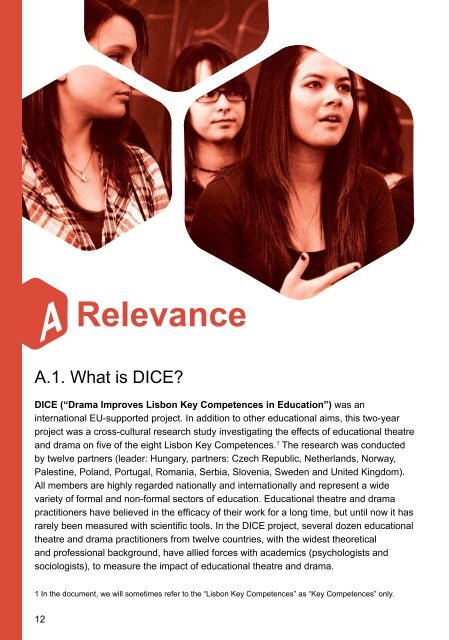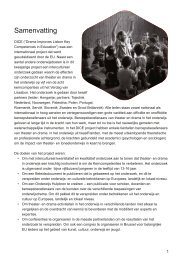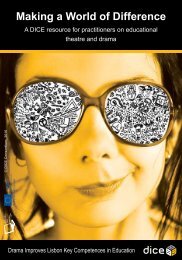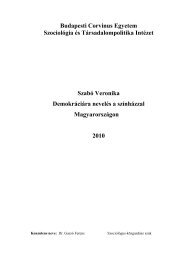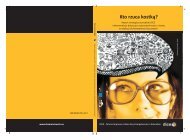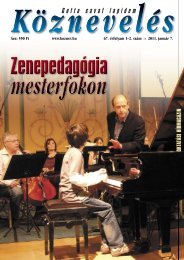Policy Paper - Drama Improves Lisbon Key Competences in Education
Policy Paper - Drama Improves Lisbon Key Competences in Education
Policy Paper - Drama Improves Lisbon Key Competences in Education
Create successful ePaper yourself
Turn your PDF publications into a flip-book with our unique Google optimized e-Paper software.
Relevance<br />
The objectives of the project were:<br />
• To demonstrate with cross-cultural quantitative and qualitative research that<br />
educational theatre and drama is a powerful tool to improve the <strong>Key</strong> <strong>Competences</strong>. The<br />
research was conducted with almost five thousand young people aged 13-16 years.<br />
• To publish a <strong>Policy</strong> <strong>Paper</strong> (the book you are read<strong>in</strong>g), based on the research,<br />
and dissem<strong>in</strong>ate it among educational and cultural stakeholders at the European,<br />
national, and local levels worldwide.<br />
• To create an <strong>Education</strong> Resource - a publication for schools, educators and arts<br />
practitioners about the different practices of educational theatre and drama. To<br />
dissem<strong>in</strong>ate this pack at the European, national, and local levels worldwide.<br />
• To compare theatre and drama activities <strong>in</strong> education <strong>in</strong> different countries and help<br />
the transfer of know-how with the mobility of experts.<br />
• To hold conferences <strong>in</strong> most of the partner countries <strong>in</strong> order to dissem<strong>in</strong>ate the<br />
results of the project, as well as a conference <strong>in</strong> Brussels to dissem<strong>in</strong>ate the first ma<strong>in</strong><br />
results to key EU leaders <strong>in</strong> the relevant areas of arts, culture, education and youth.<br />
Relevance<br />
Our hypothesis was that educational theatre and drama has an impact on five of the<br />
eight “<strong>Lisbon</strong> <strong>Key</strong> <strong>Competences</strong>.”<br />
Relevance<br />
A.1. What is DICE?<br />
DICE (“<strong>Drama</strong> <strong>Improves</strong> <strong>Lisbon</strong> <strong>Key</strong> <strong>Competences</strong> <strong>in</strong> <strong>Education</strong>”) was an<br />
<strong>in</strong>ternational EU-supported project. In addition to other educational aims, this two-year<br />
project was a cross-cultural research study <strong>in</strong>vestigat<strong>in</strong>g the effects of educational theatre<br />
and drama on five of the eight <strong>Lisbon</strong> <strong>Key</strong> <strong>Competences</strong>. 1 The research was conducted<br />
by twelve partners (leader: Hungary, partners: Czech Republic, Netherlands, Norway,<br />
Palest<strong>in</strong>e, Poland, Portugal, Romania, Serbia, Slovenia, Sweden and United K<strong>in</strong>gdom).<br />
All members are highly regarded nationally and <strong>in</strong>ternationally and represent a wide<br />
variety of formal and non-formal sectors of education. <strong>Education</strong>al theatre and drama<br />
practitioners have believed <strong>in</strong> the efficacy of their work for a long time, but until now it has<br />
rarely been measured with scientific tools. In the DICE project, several dozen educational<br />
theatre and drama practitioners from twelve countries, with the widest theoretical<br />
and professional background, have allied forces with academics (psychologists and<br />
sociologists), to measure the impact of educational theatre and drama.<br />
1 In the document, we will sometimes refer to the “<strong>Lisbon</strong> <strong>Key</strong> <strong>Competences</strong>” as “<strong>Key</strong> <strong>Competences</strong>” only.<br />
We exam<strong>in</strong>ed the follow<strong>in</strong>g five out of the eight <strong>Key</strong><br />
<strong>Competences</strong>:<br />
1. Communication <strong>in</strong> the mother tongue<br />
2. Learn<strong>in</strong>g to learn<br />
3. Interpersonal, <strong>in</strong>tercultural<br />
and social competences,<br />
civic competence<br />
4. Entrepreneurship<br />
5. Cultural expression<br />
Furthermore, we believe that<br />
there is a competence not<br />
mentioned among the <strong>Key</strong><br />
<strong>Competences</strong>, which is the<br />
universal competence of what<br />
it is to be human. We have<br />
called this competence “All this<br />
and more”, and <strong>in</strong>cluded it <strong>in</strong> the<br />
discussion of the research results.<br />
These six are life-long learn<strong>in</strong>g skills<br />
and competences necessary for the personal<br />
development of young people, their future employment,<br />
and active European citizenship.<br />
Pedagogical<br />
credo of DICE<br />
Openness, empathy and<br />
responsibility are the fundamentals of active<br />
citizenship, pluralism, solidarity and civil dialogue.<br />
To <strong>in</strong>crease openness, empathy and responsibility <strong>in</strong> society,<br />
we need to target children and youth. Children are the members<br />
of tomorrow’s society, capable of new ideas with a develop<strong>in</strong>g<br />
personality. We should empower more and more children to<br />
understand the values of democracy, be sensitive to social<br />
problems, have the ability to ask valid questions and exam<strong>in</strong>e<br />
answers from multiple po<strong>in</strong>ts of view, so they will become openm<strong>in</strong>ded,<br />
empathic and responsible.<br />
To reach children, we need a tool that will deeply <strong>in</strong>terest and<br />
engage them. We should teach them through the art form of theatre<br />
and drama, and through dramatic role-play and stories <strong>in</strong> which<br />
the pupils become actively engaged <strong>in</strong> exploratory <strong>in</strong>vestigation<br />
of moral, social or curriculum contents and what it means<br />
to be human <strong>in</strong> a contemporary world. In this way<br />
they become enabled and empowered –<br />
active and th<strong>in</strong>k<strong>in</strong>g citizens.<br />
12<br />
13


